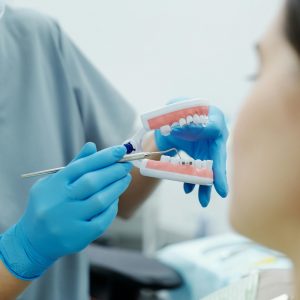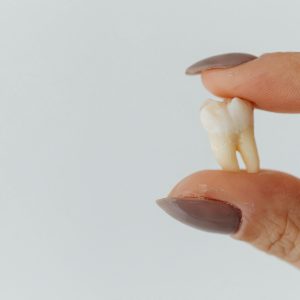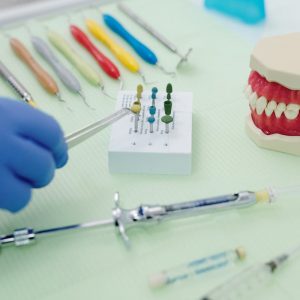- Teeth contouring is ideal for subtle reshaping; veneers are suited for dramatic makeovers.
- Veneers cost more but offer longer-lasting and more comprehensive results.
- Digital Smile Design and no-prep veneers are trending in 2025.
- Choose a cosmetic dentist with good reviews to ensure safety and satisfaction.
- Proper aftercare is essential for long-lasting results, regardless of the procedure.
Introduction: The Rise of Aesthetic Dentistry
In recent years, cosmetic dentistry has seen a massive surge in demand. According to the American Academy of Cosmetic Dentistry (AACD), over $16 billion is spent annually on cosmetic dental procedures in the United States alone, reflecting the growing desire for aesthetic improvements. From teeth whitening to smile makeovers, more people are turning to minimally invasive treatments to enhance their appearance and boost self-confidence.
Among the most popular options are teeth contouring and veneers—two distinct procedures with the shared goal of perfecting smiles. But which one is right for you, and more importantly, what’s trending in 2025?
Whether you’re an individual considering cosmetic improvements or a cosmetic dentist with good reviews aiming to educate patients, this in-depth comparison breaks down everything you need to know about teeth contouring vs. veneers—from the science and suitability to costs and modern trends.
What is Teeth Contouring?
Definition and Overview
Teeth contouring, also known as dental reshaping or enameloplasty, is a non-invasive cosmetic procedure that involves the removal of small amounts of enamel to improve the shape, length, or surface of teeth. It’s typically used to address minor imperfections such as slightly overlapping or uneven teeth.
Procedure Breakdown
- Consultation: The cosmetic dentist will examine your bite and smile.
- Imaging: X-rays determine enamel thickness.
- Shaping: Small amounts of enamel are removed.
- Polishing: The tooth is smoothed and buffed for a natural finish.
Ideal Candidates
- Minor chips or uneven edges
- Slight overlapping
- Irregular tooth shape
- Pointed or excessively long teeth
Advantages
- Non-invasive: No anesthesia needed.
- Affordable: Typically costs $50–$300 per tooth.
- Quick: One session (30 minutes or less).
- Immediate results
Disadvantages
- Irreversible: Enamel does not grow back.
- Limited use: Best for mild issues only.
Not suitable for weakened enamel or sensitive teeth
What Are Veneers?
Definition
Dental veneers are thin shells of porcelain or composite resin bonded to the front surface of teeth. They alter tooth shape, size, color, and alignment.
Procedure Breakdown
- Initial consultation and smile design
- Tooth preparation: Thin layer of enamel is removed
- Impression and lab work
- Temporary veneers (optional)
- Final bonding of permanent veneers
Ideal Candidates
- Severely stained or discolored teeth
- Worn-down or broken teeth
- Gaps between teeth
- Misaligned or uneven teeth
- Moderate crowding
Advantages
- Dramatic results: Transforms smile aesthetics
- Long-lasting: Porcelain veneers last 10–15 years
- Stain-resistant: Especially porcelain veneers
- Natural look
Disadvantages
- Expensive: $900–$2,500 per tooth
- Irreversible: Requires enamel removal
- May require replacement over time
- Can cause sensitivity if not properly bonded
Many people considering veneers search for a cosmetic dentist with good reviews to ensure their investment leads to lasting, beautiful results.
Key Differences Between Teeth Contouring and Veneers
| Feature | Teeth Contouring | Veneers |
|---|---|---|
| Invasiveness | Non-invasive | Minimally invasive |
| Cost | $50–$300 per tooth | $900–$2,500 per tooth |
| Permanency | Permanent (limited reshaping) | Permanent (more visible results) |
| Suitability | Minor defects | Moderate to severe issues |
| Treatment time | One quick visit | Two or more visits |
| Material | Natural enamel reshaped | Porcelain or composite resin |
| Durability | Depends on enamel strength | 10–15 years with porcelain |
Trends in 2025: What’s Hot This Year?
1. Natural-Looking Results
Patients are increasingly opting for subtle enhancements that preserve their natural look. Teeth contouring is gaining popularity for its ability to fine-tune without dramatically altering appearance.
2. Minimal Invasive Options
With rising awareness about dental health, patients seek treatments that minimize enamel loss. Dentists are embracing advanced contouring tools for precision.
3. Porcelain Veneer Evolution
Porcelain veneers are now thinner and more lifelike. Innovations in ceramic technology allow for minimal prep veneers that maintain more of the natural tooth.
4. Digital Smile Design
Technological advancements allow dentists to create a 3D preview of a patient’s future smile, increasing confidence in both contouring and veneers.
5. Influencer-Driven Cosmetic Dentistry
Social media and influencer endorsements have led to increased visibility for both procedures. Many people search for a cosmetic dentist with good reviews based on influencer referrals.
How to Choose Between Contouring and Veneers
Consider the Following:
- Extent of imperfection: Minor? Choose contouring. Major? Choose veneers.
- Budget: Contouring is wallet-friendly.
- Longevity needed: Veneers last longer.
- Risk tolerance: Veneers involve more preparation.
- Smile goals: Want subtle refinement or a full transformation?
Practical Tip:
Book a consultation with a cosmetic dentist with good reviews who offers digital smile simulations so you can visualize the results of both options.
What to Ask Your Cosmetic Dentist

Before deciding on a procedure:
- Do I qualify for teeth contouring or veneers?
- What’s the expected result and longevity?
- Will I experience sensitivity or complications?
- How much enamel will be removed?
- What maintenance is required?
- Can I see before-and-after photos of similar cases?
A cosmetic dentist with good reviews will provide honest answers and set realistic expectations.
Real-Life Case Examples
Case 1: Minor Imperfection
- Patient: 28-year-old female
- Concern: Slight uneven edges on upper teeth
- Treatment: Contouring
- Result: Completed in 30 minutes. Smile looked polished.
Case 2: Full Smile Makeover
- Patient: 42-year-old male
- Concern: Worn down, discolored teeth
- Treatment: 10 porcelain veneers
- Result: Transformed smile, whiter and more symmetrical. Boosted confidence in professional settings.
Cost Comparison and Insurance Considerations
Teeth Contouring Costs:
- $50–$300 per tooth
- Not covered by insurance (cosmetic only)
Veneers Costs:
- $900–$2,500 per tooth
- Occasionally covered partially if for restorative purposes
Financing Options:
- Dental financing plans (CareCredit, in-house)
- Payment plans offered by many cosmetic dentists with good reviews
Maintenance & Aftercare Tips

Teeth Contouring:
- Avoid biting hard objects
- Regular checkups
- Gentle brushing with enamel-protecting toothpaste
Veneers:
- Avoid coffee, red wine (even if stain-resistant)
- Use non-abrasive toothpaste
- Wear night guard if you grind your teeth
- Professional cleanings every 6 months
Red Flags to Watch For
Contouring:
- Excessive enamel removal
- Uneven shaping
- Sensitivity not addressed
Veneers:
- Poor fit or bonding
- Gums receding around veneer
- Chipping or color mismatch
Avoid these issues by choosing a cosmetic dentist with good reviews, verified experience, and visible patient testimonials.
Final Verdict: Which Is Right for You?
- Choose Teeth Contouring If:
- You want a fast, affordable tweak.
- You’re happy with your natural smile but want it refined.
- Choose Veneers If:
- You want a dramatic transformation.
- You have multiple dental imperfections.
Remember, the best outcomes come from consulting a cosmetic dentist with good reviews who customizes your treatment based on your specific smile goals.
Expert Opinions
“Contouring is a great option for young adults with minor irregularities,” says Dr. Emily Chen, DDS. “But if you’re seeking a Hollywood-style smile, veneers offer unmatched results.”
“Technology is improving both options rapidly,” notes Dr. Jason Patel, an AACD member. “AI and 3D printing have revolutionized how we approach cosmetic planning.”
External Resources
For those looking to explore further:
Conclusion: Finding Your Best Smile Solution
Whether you opt for teeth contouring or veneers, the decision should reflect your smile goals, budget, and long-term expectations. Both methods offer aesthetic benefits, and thanks to modern advancements and trustworthy professionals, patients today have more customizable options than ever.
To ensure successful outcomes, always consult a cosmetic dentist with good reviews and prioritize personalized care. The right professional will help you decide what suits your smile best—be it the minimalist elegance of contouring or the bold transformation of veneers.
FAQs
Q1: Is teeth contouring painful?
No. Since only the enamel is reshaped, there’s typically no pain or anesthesia involved.
Q2: Are veneers worth the investment?
If you’re seeking long-term aesthetic enhancement, veneers offer durability and a natural look.
Q3: How long does it take to get veneers?
Usually 2–3 visits over 2–4 weeks.
Q4: Can I get veneers only on the front teeth?
Yes. Many people choose 6–8 veneers on the upper front teeth for aesthetic focus.
Q5: How do I find a cosmetic dentist with good reviews?
Look at online platforms like Yelp, Healthgrades, or RealSelf. Check patient before-after photos and testimonials.





